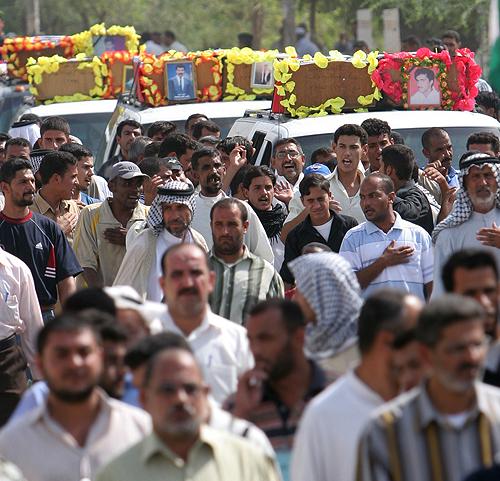Iraq report: Violence, civil strife may harm government officials

Iraqi people march during a burial ceremony held for 30 bodies that were found in a mass grave in southwestern Basra on Thursday. THE ASSOCIATED PRESS, NABIL AL-JURANI
August 24, 2007
WASHINGTON – The Iraqi government is strained by rampant violence, deep sectarian differences among its political parties and stymied leadership, the nation’s top spy analysts concluded in a sobering assessment released Thursday.
With the country teetering between success and failure in the next year, Iraq’s neighbors will continue to try to expand their leverage in the fractured state in anticipation that the United States will soon leave, the new report found.
It predicted that the Iraqi government “will become more precarious over the next six to 12 months” because of criticism from various Shiite, Sunni and Kurdish factions. “To date, Iraqi political leaders remain unable to govern effectively,” it said.
There was a glimmer of backhanded hope for the Iraqi leadership in the often dark analysis: Iraqi Prime Minister Nouri al-Maliki will continue to benefit from the belief among other Shiite leaders that “searching for a replacement could paralyze the government.”
The new National Intelligence Estimate was an update of another high-level assessment prepared six months ago by the top analysts scattered across all 16 U.S. spy agencies. The CIA and Defense Intelligence Agency were the key contributors to Thursday’s report, which found some security progress but elusive hopes for reconciliation among Iraq’s feuding groups.
Get The Daily Illini in your inbox!
It came at a time of renewed tensions between Washington and Baghdad, and as the Bush administration prepares a mid-September report on how this year’s troop buildup in Iraq is working.
Overall, the report finds that Iraq’s security will continue to “improve modestly” over the next six to 12 months, provided that coalition forces mount strong counterinsurgency operations and mentor Iraqi forces. But even then, violence levels will remain high as the country struggles to achieve national political reconciliation.
“The strains of the security situation and absence of key leaders have stalled internal political debates, slowed national decision-making, and increased Maliki’s vulnerability” to factions that could form a rivaling coalition, the document says.
Although al-Maliki is a Shiite, it finds that other Shiite factions have looked at ways to constrain him.
The administration and the many opponents of its Iraq policy both will find evidence in the report to justify the policies they recommend.
Senate Majority Leader Harry Reid, D-Nev., said the report confirms what most Americans know.
“Our troops are mired in an Iraqi civil war and the president’s escalation strategy has failed to produce the political results he promised to our troops and the American people,” he said.
Yet the report also backed many of the administration’s arguments: the troop buildup announced in January has created new room for success, and the military can’t leave quickly or shift its focus from efforts to stop insurgents and stabilize the Iraqi government.
Earlier this week President Bush said the Iraqi government clearly could do more, but he and his aides quickly sought to tamp down suggestions the administration had lost faith in al-Maliki.
“This is a government that is learning – frankly – learning how to govern,” White House spokesman Gordon Johndroe said. “No, it is not moving nearly as fast as everyone in Washington, D.C., would like it to move.”






